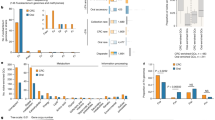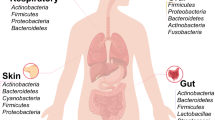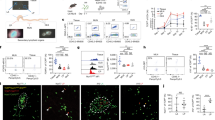Abstract
Thiostrepton (TST) is a natural antibiotic with pleiotropic properties. This study aimed to elucidate the therapeutic effect of TST on experimental colitis and identify its targets. The effect of TST on colon inflammation was evaluated in a dextran sulfate sodium (DSS)-induced colitis model and a T-cell transfer colitis model. The therapeutic targets of TST were investigated by cytokine profiling, immunophenotyping and biochemical approaches. The effect of TST on the gut microbiota and its contribution to colitis were evaluated in mice with DSS-induced colitis that were subjected to gut microbiota depletion and fecal microbiota transplantation (FMT). Alterations in the gut microbiota caused by TST were determined by 16S rDNA and metagenomic sequencing. Here, we showed that TST treatment significantly ameliorated colitis in the DSS-induced and T-cell transfer models. Specifically, TST targeted the retinoic acid-related orphan nuclear receptor RORγt to reduce the production of IL-17A by γδ T cells, type 3 innate lymphoid cells (ILC3s) and Th17 cells in mice with DSS-induced colitis. Similarly, TST selectively prevented the development of Th17 cells in the T-cell transfer colitis model and the differentiation of naïve CD4+ T cells into Th17 cells in vitro. Mechanistically, TST induced the ubiquitination and degradation of RORγt by promoting the binding of Itch to RORγt. Moreover, TST also reversed dysbiosis to control colonic inflammation. Taken together, these results from our study describe the previously unexplored role of TST in alleviating colonic inflammation by reducing IL-17A production and modulating dysbiosis, suggesting that TST is a promising candidate drug for the treatment of IBD.
This is a preview of subscription content, access via your institution
Access options
Subscribe to this journal
Receive 12 digital issues and online access to articles
$119.00 per year
only $9.92 per issue
Buy this article
- Purchase on Springer Link
- Instant access to full article PDF
Prices may be subject to local taxes which are calculated during checkout








Similar content being viewed by others
Data availability
Raw 16 S rRNA sequencing and metagenomic sequencing data have been deposited in the European Nucleotide Archive (http://www.ebi.ac.uk/ena) with Study No. PRJEB53485. The other data are available from the corresponding author upon reasonable request.
References
Kaplan GG. The global burden of IBD: from 2015 to 2025. Nat Rev Gastroenterol Hepatol. 2015;12:720–7. https://doi.org/10.1038/nrgastro.2015.150.
Collaborators, GBDIBD. The global, regional, and national burden of inflammatory bowel disease in 195 countries and territories, 1990–2017: a systematic analysis for the Global Burden of Disease Study 2017. Lancet Gastroenterol Hepatol. 2020;5:17–30. https://doi.org/10.1016/S2468-1253(19)30333-4.
Caruso R, Lo BC, Nunez G. Host-microbiota interactions in inflammatory bowel disease. Nat Rev Immunol. 2020;20:411–26. https://doi.org/10.1038/s41577-019-0268-7.
Ianiro G, Tilg H, Gasbarrini A. Antibiotics as deep modulators of gut microbiota: between good and evil. Gut. 2016;65:1906–15. https://doi.org/10.1136/gutjnl-2016-312297.
Sokol H. Antibiotics: a trigger for inflammatory bowel disease? Lancet Gastroenterol Hepatol. 2020;5:956–7. https://doi.org/10.1016/S2468-1253(20)30208-9.
Maier L, Goemans CV, Wirbel J, Kuhn M, Eberl C, Pruteanu M, et al. Unravelling the collateral damage of antibiotics on gut bacteria. Nature. 2021;599:120–4. https://doi.org/10.1038/s41586-021-03986-2.
Nanda KS, Cheifetz AS, Moss AC. Impact of antibodies to infliximab on clinical outcomes and serum infliximab levels in patients with inflammatory bowel disease (IBD): a meta-analysis. Am J Gastroenterol. 2013;108:40–7. https://doi.org/10.1038/ajg.2012.363.
Hoentjen F, Harmsen HJ, Braat H, Torrice CD, Mann BA, Sartor RB, et al. Antibiotics with a selective aerobic or anaerobic spectrum have different therapeutic activities in various regions of the colon in interleukin 10 gene deficient mice. Gut. 2003;52:1721–7. https://doi.org/10.1136/gut.52.12.1721.
Garrett WS, Lord GM, Punit S, Lugo-Villarino G, Mazmanian SK, Ito S, et al. Communicable ulcerative colitis induced by T-bet deficiency in the innate immune system. Cell. 2007;131:33–45. https://doi.org/10.1016/j.cell.2007.08.017.
Strati F, Pujolassos M, Burrello C, Giuffre MR, Lattanzi G, Caprioli F, et al. Antibiotic-associated dysbiosis affects the ability of the gut microbiota to control intestinal inflammation upon fecal microbiota transplantation in experimental colitis models. Microbiome. 2021;9:39. https://doi.org/10.1186/s40168-020-00991-x.
Ivanov II, Frutos Rde L, Manel N, Yoshinaga K, Rifkin DB, Sartor RB, et al. Specific microbiota direct the differentiation of IL-17-producing T-helper cells in the mucosa of the small intestine. Cell Host Microbe. 2008;4:337–49. https://doi.org/10.1016/j.chom.2008.09.009.
Yang Y, Torchinsky MB, Gobert M, Xiong H, Xu M, Linehan JL, et al. Focused specificity of intestinal TH17 cells towards commensal bacterial antigens. Nature. 2014;510:152–6. https://doi.org/10.1038/nature13279.
Omenetti S, Bussi C, Metidji A, Iseppon A, Lee S, Tolaini M, et al. The intestine harbors functionally distinct homeostatic tissue-resident and inflammatory Th17 cells. Immunity. 2019;51:77–89.e6. https://doi.org/10.1016/j.immuni.2019.05.004.
Alexander M, Ang QY, Nayak RR, Bustion AE, Sandy M, Zhang B, et al. Human gut bacterial metabolism drives Th17 activation and colitis. Cell Host Microbe. 2022;30:17–30.e9. https://doi.org/10.1016/j.chom.2021.11.001.
Tauber SC, Nau R. Immunomodulatory properties of antibiotics. Curr Mol Pharm. 2008;1:68–79.
Altenburg J, de Graaff CS, van der Werf TS, Boersma WG. Immunomodulatory effects of macrolide antibiotics - part 1: biological mechanisms. Respiration. 2011;81:67–74. https://doi.org/10.1159/000320319.
Almeida L, Dhillon-LaBrooy A, Castro CN, Adossa N, Carriche GM, Guderian M, et al. Ribosome-targeting antibiotics impair T cell effector function and ameliorate autoimmunity by blocking mitochondrial protein synthesis. Immunity. 2021;54:68–83.e6. https://doi.org/10.1016/j.immuni.2020.11.001.
Hegde NS, Sanders DA, Rodriguez R, Balasubramanian S. The transcription factor FOXM1 is a cellular target of the natural product thiostrepton. Nat Chem. 2011;3:725–31. https://doi.org/10.1038/nchem.1114.
Lai CY, Yeh DW, Lu CH, Liu YL, Huang LR, Kao CY, et al. Identification of thiostrepton as a novel inhibitor for psoriasis-like inflammation induced by TLR7-9. J Immunol. 2015;195:3912–21. https://doi.org/10.4049/jimmunol.1500194.
Kim TH, Hanh BTB, Kim G, Lee DG, Park JW, Lee SE, et al. Thiostrepton: a novel therapeutic drug candidate for mycobacterium abscessus infection. Molecules. 2019;24. https://doi.org/10.3390/molecules24244511.
Walter JD, Hunter M, Cobb M, Traeger G, Spiegel PC. Thiostrepton inhibits stable 70S ribosome binding and ribosome-dependent GTPase activation of elongation factor G and elongation factor 4. Nucleic Acids Res. 2012;40:360–70. https://doi.org/10.1093/nar/gkr623.
Hasegawa T, Kikuta J, Sudo T, Matsuura Y, Matsui T, Simmons S, et al. Identification of a novel arthritis-associated osteoclast precursor macrophage regulated by FoxM1. Nat Immunol. 2019;20:1631–43. https://doi.org/10.1038/s41590-019-0526-7.
Kim JJ, Shajib MS, Manocha MM, Khan WI. Investigating intestinal inflammation in DSS-induced model of IBD. J Vis Exp. 2012. https://doi.org/10.3791/3678.
Koelink PJ, Wildenberg ME, Stitt LW, Feagan BG, Koldijk M, van 't Wout AB, et al. Development of reliable, valid and responsive scoring systems for endoscopy and histology in animal models for inflammatory bowel disease. J Crohns Colitis. 2018;12:794–803. https://doi.org/10.1093/ecco-jcc/jjy035.
Ohnmacht C, Park JH, Cording S, Wing JB, Atarashi K, Obata Y, et al. MUCOSAL IMMUNOLOGY. The microbiota regulates type 2 immunity through RORgammat(+) T cells. Science. 2015;349:989–93. https://doi.org/10.1126/science.aac4263.
Smith PM, Howitt MR, Panikov N, Michaud M, Gallini CA, Bohlooly YM, et al. The microbial metabolites, short-chain fatty acids, regulate colonic Treg cell homeostasis. Science. 2013;341:569–73. https://doi.org/10.1126/science.1241165.
Dudakov JA, Hanash AM, van den Brink MR. Interleukin-22: immunobiology and pathology. Annu Rev Immunol. 2015;33:747–85. https://doi.org/10.1146/annurev-immunol-032414-112123.
Ichiyama K, Hashimoto M, Sekiya T, Nakagawa R, Wakabayashi Y, Sugiyama Y, et al. Gfi1 negatively regulates T(h)17 differentiation by inhibiting RORgammat activity. Int Immunol. 2009;21:881–9. https://doi.org/10.1093/intimm/dxp054.
Rutz S, Kayagaki N, Phung QT, Eidenschenk C, Noubade R, Wang X, et al. Deubiquitinase DUBA is a post-translational brake on interleukin-17 production in T cells. Nature. 2015;518:417–21. https://doi.org/10.1038/nature13979.
Han L, Yang J, Wang X, Wu Q, Yin S, Li Z, et al. The E3 deubiquitinase USP17 is a positive regulator of retinoic acid-related orphan nuclear receptor gammat (RORgammat) in Th17 cells. J Biol Chem. 2014;289:25546–55. https://doi.org/10.1074/jbc.M114.565291.
Kathania M, Khare P, Zeng M, Cantarel B, Zhang H, Ueno H, et al. Itch inhibits IL-17-mediated colon inflammation and tumorigenesis by ROR-gammat ubiquitination. Nat Immunol. 2016;17:997–1004. https://doi.org/10.1038/ni.3488.
Yang J, Xu P, Han L, Guo Z, Wang X, Chen Z, et al. Cutting edge: Ubiquitin-specific protease 4 promotes Th17 cell function under inflammation by deubiquitinating and stabilizing RORgammat. J Immunol. 2015;194:4094–7. https://doi.org/10.4049/jimmunol.1401451.
Deleu S, Machiels K, Raes J, Verbeke K, Vermeire S. Short chain fatty acids and its producing organisms: An overlooked therapy for IBD? EBioMedicine. 2021;66:103293. https://doi.org/10.1016/j.ebiom.2021.103293.
Zhang Z, Zhang H, Chen T, Shi L, Wang D, Tang D. Regulatory role of short-chain fatty acids in inflammatory bowel disease. Cell Commun Signal. 2022;20:64. https://doi.org/10.1186/s12964-022-00869-5.
Huda-Faujan N, Abdulamir AS, Fatimah AB, Anas OM, Shuhaimi M, Yazid AM, et al. The impact of the level of the intestinal short chain Fatty acids in inflammatory bowel disease patients versus healthy subjects. Open Biochem J. 2010;4:53–8. https://doi.org/10.2174/1874091X01004010053.
Parada Venegas D, De la Fuente MK, Landskron G, Gonzalez MJ, Quera R, Dijkstra G, et al. Short chain fatty acids (SCFAs)-mediated gut epithelial and immune regulation and its relevance for inflammatory bowel diseases. Front Immunol. 2019;10:277. https://doi.org/10.3389/fimmu.2019.00277.
Isono F, Fujita-Sato S, Ito S. Inhibiting RORgammat/Th17 axis for autoimmune disorders. Drug Discov Today. 2014;19:1205–11. https://doi.org/10.1016/j.drudis.2014.04.012.
Huh JR, Leung MW, Huang P, Ryan DA, Krout MR, Malapaka RR, et al. Digoxin and its derivatives suppress TH17 cell differentiation by antagonizing RORgammat activity. Nature. 2011;472:486–90. https://doi.org/10.1038/nature09978.
Hang S, Paik D, Yao L, Kim E, Trinath J, Lu J, et al. Bile acid metabolites control T(H)17 and T(reg) cell differentiation. Nature. 2019;576:143–8. https://doi.org/10.1038/s41586-019-1785-z.
Xiao S, Yosef N, Yang J, Wang Y, Zhou L, Zhu C, et al. Small-molecule RORgammat antagonists inhibit T helper 17 cell transcriptional network by divergent mechanisms. Immunity. 2014;40:477–89. https://doi.org/10.1016/j.immuni.2014.04.004.
Solt LA, Kumar N, Nuhant P, Wang Y, Lauer JL, Liu J, et al. Suppression of TH17 differentiation and autoimmunity by a synthetic ROR ligand. Nature. 2011;472:491–4. https://doi.org/10.1038/nature10075.
Withers DR, Hepworth MR, Wang X, Mackley EC, Halford EE, Dutton EE, et al. Transient inhibition of ROR-gammat therapeutically limits intestinal inflammation by reducing TH17 cells and preserving group 3 innate lymphoid cells. Nat Med. 2016;22:319–23. https://doi.org/10.1038/nm.4046.
Han T, Goralski M, Gaskill N, Capota E, Kim J, Ting TC, et al. Anticancer sulfonamides target splicing by inducing RBM39 degradation via recruitment to DCAF15. Science. 356. https://doi.org/10.1126/science.aal3755 (2017).
Slabicki M, Kozicka Z, Petzold G, Li YD, Manojkumar M, Bunker RD, et al. The CDK inhibitor CR8 acts as a molecular glue degrader that depletes cyclin K. Nature. 2020;585:293–7. https://doi.org/10.1038/s41586-020-2374-x.
Kronke J, Udeshi ND, Narla A, Grauman P, Hurst SN, McConkey M, et al. Lenalidomide causes selective degradation of IKZF1 and IKZF3 in multiple myeloma cells. Science. 2014;343:301–5. https://doi.org/10.1126/science.1244851.
Kronke J, Fink EC, Hollenbach PW, MacBeth KJ, Hurst SN, Udeshi ND, et al. Lenalidomide induces ubiquitination and degradation of CK1alpha in del(5q) MDS. Nature. 2015;523:183–8. https://doi.org/10.1038/nature14610.
Isobe Y, Okumura M, McGregor LM, Brittain SM, Jones MD, Liang X, et al. Manumycin polyketides act as molecular glues between UBR7 and P53. Nat Chem Biol. 2020;16:1189–98. https://doi.org/10.1038/s41589-020-0557-2.
Song X, Sun X, Oh SF, Wu M, Zhang Y, Zheng W, et al. Microbial bile acid metabolites modulate gut RORgamma(+) regulatory T cell homeostasis. Nature. 2020;577:410–5. https://doi.org/10.1038/s41586-019-1865-0.
Sefik E, Geva-Zatorsky N, Oh S, Konnikova L, Zemmour D, McGuire AM, et al. MUCOSAL IMMUNOLOGY. Individual intestinal symbionts induce a distinct population of RORgamma(+) regulatory T cells. Science. 2015;349:993–7. https://doi.org/10.1126/science.aaa9420.
Yang BH, Hagemann S, Mamareli P, Lauer U, Hoffmann U, Beckstette M, et al. Foxp3(+) T cells expressing RORgammat represent a stable regulatory T-cell effector lineage with enhanced suppressive capacity during intestinal inflammation. Mucosal Immunol. 2016;9:444–57. https://doi.org/10.1038/mi.2015.74.
Acknowledgements
This work was supported by the National Key Research and Development Program of China (2018YFA0507900), the National Natural Science Foundation of China (81802460) and the Natural Science Foundation of Chongqing (CSTB2022NSCQ-MSX0184). We thank Hongwei Li (Third Military Medical University, Chongqing, China) for technical assistance in molecular docking. We thank Dr. Lilin Ye and Dr. Jihang Zhang (Third Military Medical University, Chongqing, China) for the fruitful discussions and review of our manuscript and for helping with the FACS experiment.
Author information
Authors and Affiliations
Contributions
YL, CL and YL were involved in the study design and drafted the paper; YL, CL and YL performed all the experiments with the help of XLZ and JL. SMY and CJH devised, coordinated, and supervised the project.
Corresponding authors
Ethics declarations
Competing interests
The authors declare no competing interests.
Supplementary information
Rights and permissions
Springer Nature or its licensor (e.g. a society or other partner) holds exclusive rights to this article under a publishing agreement with the author(s) or other rightsholder(s); author self-archiving of the accepted manuscript version of this article is solely governed by the terms of such publishing agreement and applicable law.
About this article
Cite this article
Luo, Y., Liu, C., Luo, Y. et al. Thiostrepton alleviates experimental colitis by promoting RORγt ubiquitination and modulating dysbiosis. Cell Mol Immunol 20, 1352–1366 (2023). https://doi.org/10.1038/s41423-023-01085-y
Received:
Accepted:
Published:
Issue Date:
DOI: https://doi.org/10.1038/s41423-023-01085-y



